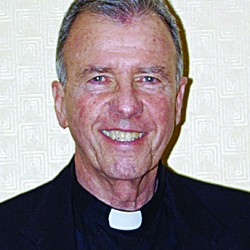 by Father Robert Lauder
by Father Robert Lauder
First in a series
Until I took Father Joe Kelly’s course last fall on spiritual direction, I had never read anything by Evelyn Underhill, though in my reading I had frequently come across references to her.
Father Kelly, a priest of the Archdiocese of New York, is a spiritual director at the House of Formation for seminarians at The Immaculate Conception Center in Douglaston. The course involved six sessions and an exceptionally good reading list. I greatly enjoyed some of the essays that were assigned to us. Evelyn Underhill’s book, “The Spiritual Life” (Morehouse Publishing, North America, 1937, pp. 127), was one of the required readings, and I am glad that it was. Underhill (1875-1941) was a prolific British writer on mysticism and spiritual growth.
Revised and slightly expanded for publication, “The Spiritual Life” was originally four broadcast talks. Underhill explained their origin in the following words:
“My object was to present some of the great truths concerning man’s spiritual life in simple language; treating it ,not as an intense form of other-worldliness remote from the common ways and incompatible with the common life, but rather as the heart of all real religion and therefore of vital concern to ordinary men and women. So far as possible therefore, the use of technical theological terms and direct references to Christian dogma has been avoided; but I believe all that is written here to be in complete harmony with Christian belief.”
I can only guess what effect reading Underhill’s book might have on others. For me, her small volume dealt clearly and powerfully with ideas and problems that I have been thinking about for a very long time.
Underhill beautifully articulates what being a believer means and sketches how trying to live without a deep relationship with God is to miss why we are here. But it is not just because Underhill deals with ideas that interest me that I am enthusiastic about the small volume. She presents insights that I find are not only interesting but also should help me in my efforts to grow closer to God.
One Human Life
As I have written previously in this column, I am uncomfortable with the term “the spiritual life” because I am afraid that the term suggests some kind of life separate from our day to day existence, divorced from our life in this world. There is one human life, and it has been touched and redeemed by God.
Wisely, Underhill cautions against an individualistic approach to God. Individualism in relation to how we approach God seems to be a constant temptation, though it can take various forms. The most extreme expression can be described with the phrase “Jesus and me,” indicating that all that matters is between an individual and God and does not include God’s concern for others, nor the profound truth that our meaning and our destiny includes our relation with others.
I believe that our very being is oriented toward God, and I think that how we relate to other human persons can serve as a barometer in evaluating how we relate to God.
One reason I am so impressed by Underhill’s thought is that she has put into religious terms some of the truths about God and the human person that I try to express in philosophy to students at St. John’s University. What I think some of my favorite philosophers express about the mystery of the human person and the mystery of God, Underhill expresses in the context of religious faith.
In trying to help us make sense of our lives and also help us to respond to God’s presence in our lives, Underhill stresses that we have to broaden our horizons and deepen our grasp of the mystery of God and our relationship with God. No doubt Underhill is correct. I want to allow that to happen in my own life. One of my problems as a priest is trying to figure out how I can help others to allow that to happen in their lives. Underhill writes the following:
“For a spiritual life is simply a life in which all that we do comes from the centre, where we are anchored to God: a life soaked through and through by a sense of His reality and claim, and self-given to the great movement of His will.” (p. 32)
I love the expression “a life soaked through and through by a sense of His reality.” That is the goal, and to the extent that a person achieves it, everything in the person’s life will take on a new and deeper meaning. No aspect of the person’s life will be excluded from the person’s “spiritual life.” The person will really be living.[hr] Father Robert Lauder, a priest of the Diocese of Brooklyn and philosophy professor at St. John’s University, Jamaica, writes a weekly column for the Catholic Press.
